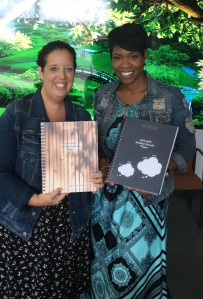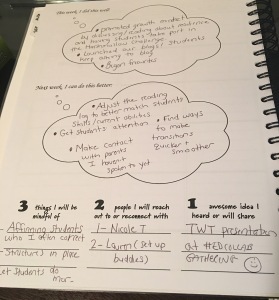
I consider myself a reflective teacher and I consider myself a writer. Interestingly enough, my lesson planbook has never quite been a place where I show either of those aspects of myself. Quick jots and page numbers are what you might find by looking in my planbook. But what if there was a way to build in opportunities to reflect, in writing, about my teaching right in the place where the lesson plans reside? And what if that place could also offer daily inspiration and opportunities to set positive intentions for the week ahead?
Nicolette James had that very idea. Nicolette and I met at the Long Island Writing Project several years ago and have been friends and “kindred spirits” (as Anne Shirley might say) ever since. As a high school English teacher and Chairperson of the English Department at Westbury High School, Nicolette is passionate about teaching, learning, and helping others to become the best versions of themselves. Last summer, Nicolette and I had many Voxer conversations about a planbook she designed to help educators be more reflective and intentional in their teaching. She explores the idea of being an intentional educator on www.educazen.org, where she writes, “Educating with Intention is the daily decision to improve teaching, learning and leading through the purposeful and holistic integration of growth mindset (the belief that intelligence is malleable and can be developed through dedication and hard work), mindfulness (a mental state achieved by focusing one’s awareness on the present moment), and reflective practice (a continuous cycle of self-observation and self-evaluation) in all areas of one’s life. To be an Intentional Educator, it is imperative that we bring our best selves to work every day. To educate with intention is to develop our minds, bodies and spirits as we seek to influence those whose lives we touch to join us in doing the same. Thus, I have attempted to incorporate that philosophy into the planner.”
All summer, through the magic of Voxer, Nicolette and I spoke about our dreams and goals for the upcoming year, as well as this exciting venture of publishing her new 2016-2017 Intentional Educator Planner. On Saturday, at the Long Island Writing Project, Nicolette gifted me with my very own Intentional Educator Planner. While designed for teachers with 5 preps or 5 subjects to teach, there are 5 boxes in which to write each day. As an elementary teacher, I need 6 boxes each day, so I am going to adapt this planner to reflect my literacy instruction and keep track of my small group lessons. I am excited to use the weekly reflective prompts. Each week offers the opportunity to use writing to set an intention, think about what I am grateful for, note what I am looking forward to and what I learned. What will be the impact of this type of reflective and intentional thinking sharing the same space as my lesson plans? I envision and hope that by putting these reflections and goals in writing, I will be inspired to create richer, more meaningful lessons.

On Saturday, not only did I get the gift of this incredible planner, I had the opportunity to be part of a workshop Nicolette led for us at the Long Island Writing Project. Entitled, “The Power of Reflection and Goal Setting: Looking Back to Plan Ahead”, Nicolette opened the session by sharing this quote:
Participants reflected in writing on this quote and what it means to us. I thought about the things I fail to notice. I’ve found myself recently stopping to look at the sky and realize I often don’t notice the beauty of the world around me in my hustle and bustle, go-go-go approach to the day. I thought about my students- 24 third graders- and do I always notice each of them? After we shared our thoughts around this quote, Nicolette asked us to consider what “mindfulness” means to each of us. We then engaged in a meditation where we listened for the sound of a bell and tried to attach one of our worries to the bell, sending the worry off as the bell got lower and lower.
Next, Nicolette gave us a series of prompts to respond to in writing. Connecting to the quote, she asked us to consider what we might be failing to notice professionally, socially, personally, financially, and in regards to our health. We spent some time writing about each of those areas. Then, Nicolette had us stand up in “concentric circles.” The group split in half, with some of us faced outwards, and the other participants each stood in front of us, forming an outside circle. We shared one category that we just wrote about, before the outer circle rotated to the next person. Thus, you shared all of your ideas with several different people. I had so many rich conversations!
After thinking through all these aspects of ourselves, Nicolette asked us to consider this school year and write, “What will you start doing? What will you stop doing?” From there, she discussed the idea of setting an intention and then creating a goal. Your intention is the vision you are working towards and the goal is the actionable steps for how you can get there.


This workshop reminded me of the power that comes when you slow down, take the time to reflect, and select goals that will move you forward. Writing is a tool that we can use to reflect and be more intentional about all we do. The Intentional Educator Planner is a fantastic way to build in weekly reflection and goal setting.
How do you use writing to reflect on your teaching and set intentions for your professional practice? Continue the conversation in the comments!



Oddly enough, I find I am still a reflective educator. Maybe even more so now that I have more time. I’m so sorry I missed what sounds like an amazing workshop. That gal, Nicolette, is so smart and inventive. Sounds like it was a “10!”
LikeLike
Kathleen, this was a great reflective post. Writing matters and reflection helps us refine our writing. Well done!
LikeLike
I set up a personal blog in order to do more reflection in my practice. I am still figuring out ways to make it meaningful and efficient, but it has been really helpful so far.
LikeLike